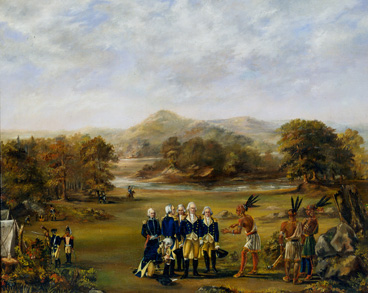Following the conclusion of the War of 1812, alliances with American Indians became more complicated. While some tribal groups still traded and maintained a relationship with British and Canadian allies from during the war, others felt betrayed by the lack of a provision in the Treaty of Ghent establishing boundaries for tribal lands. Shifting economies also put less importance on Native trading partners, as both Canadians and Americans began emphasizing instead agriculture and industry.
Following the expulsion of the British, the Americans saw little need for military alliance with Native peoples. In the region where the middle ground had once flourished, US territories and eventually states emerged.

Library of Congress
Immediately following the War of 1812, the British in Canada continued to lavish gifts on their Indian allies, which undermined the ability of the Americans to establish peace with many tribal groups, such as the Ojibwe, Menominee, Ho-Chunk, and Sauk and Fox. American officials feared an uprising led by Tenskwatawa and supported by the British, and thus the Americans occupied old British forts and began constructing many new fortifications. Dramatic American losses at the hands of British-allied Indians during the war—in the Battle of the River Raisin in southeastern Michigan and the Fort Dearborn massacre in present-day Chicago, for example—reinforced pre-existing American attitudes towards Indians. Ultimately, such fears of a new British-Indian military alliance were unfounded. Many Native people felt that the British had abandoned them in the Treaty of Ghent, and indeed British economic interests had begun to shift from furs (a trade in which Native suppliers were central) to grain and raw materials.
Once the United States gained control of the Great Lakes region (and after their own failed attempt to preserve a peaceful middle ground), the Americans began to ignore the patterns of communication and exchange that had characterized the long-standing relationships between Indians and Europeans. Following the expulsion of the British, the Americans saw little need for military alliance with Native peoples. In the region where the middle ground had once flourished, US territories and eventually states emerged. The gradual loss of Native economic and political power after the War of 1812 meant the consolidation of American influence and a transition from an amorphous frontier to increasingly rigid borders.
Part of a series of articles titled Erosion of the Middle Ground: Native Peoples of the Great Lakes Region after 1815 .
Last updated: August 23, 2017
